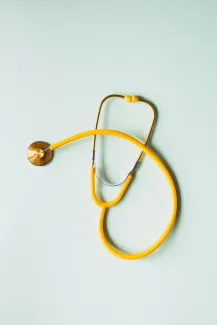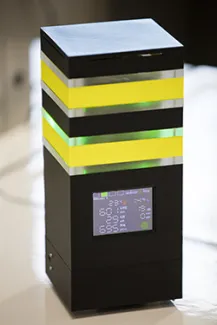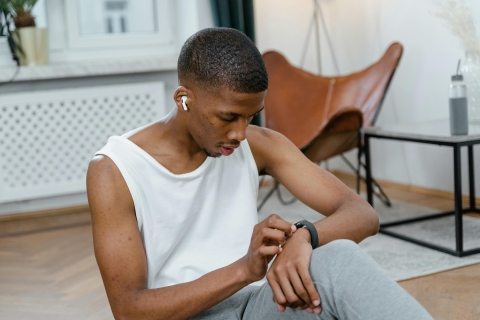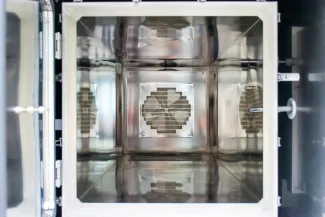
Preventive and personalised healthcare
Preventive healthcare focuses on keeping people healthy. It ensures that a disorder is diagnosed and treated at an early stage in order to prevent worse. At VITO, we develop test methods, identify new biomarkers and carry out meticulous air quality measurements. Soon, we will open a test centre for air purification devices.
Personalised health and data
If we want to offer personalised health care, we need data. We Are gives citizens ownership of their own data and involves them in decisions about the platform that manages the data. The citizen decides with whom he shares his data.
Sharing that data promotes the development of new services tailored to a person or a group of people. In this way, companies can accelerate innovation based on data provided by their target group.
We Are technology is at the service of companies that develop specific applications with personalised data.
Better indoor air quality to prevent diseases and virus transmission
Air quality, the building envelope and the ventilation system of a building jointly determine a large part of the indoor air quality. In addition, this quality is also determined by indoor sources such as building materials like wood, insulation and floor coverings and cleaning products, paints and glues, scented candles, etc.
VITO has unique expertise in the field of air quality measurements. We intensively use our test laboratories for sensor validation. For example, CO2 meters which indicate whether an indoor environment is well ventilated and therefore 'corona safe'. We also conduct efficiency tests on industrial air purification techniques and on building materials that absorb harmful substances. All to ensure a better indoor environment.
Sensorbox measures indoor air quality
When it comes to thorough measurements, the Sensorbox from VITO contains various sensors to measure the substances in the indoor air. These data are sent to a central server at VITO, which processes them in depth.
In the longer term, broad data processing, comparison and analysis are possible and important. A Sensorbox maps out the behaviour of residents and can give tips on how to ventilate properly.

A sensor network in your town or company?
Would you like to monitor the air quality in your city or company with a sensor network? Our experts are at your service.
Quality guarantee for air purifiers
In the past, air purification equipment was seen as a luxury. In the meantime, the regulations on new buildings and thorough renovation have stressed the need for good air purification.
The COVID19 pandemic has reinforced this need. International research has shown that the increased risk of infection in a closed room has everything to do with poor ventilation. Opening doors and windows and providing plenty of ventilation are ideal, but not always appropriate.
Air purification devices can fill in the gap, but do they do what they promise?
VITO's new test centre, that opened in 2022, provides an objective and scientific answer to this question. It will be checked whether and to what extent air purification devices effectively purify the air. We examine the degree of purification, both quantitatively and qualitatively.
Test the efficiency of your technology
Would you like to determine the profitability of your innovative air purification technology? VITO carries out accurate air quality measurements, traces sources and characterises hotspots. Our experts are at your service. Contact Jeroen today.
In vitro system replaces animals in inhalation tests
According to European legislation, every product or by-product that can be inhaled must be tested for its harmfulness to humans. Until now, these inhalation tests have been carried out using large numbers of laboratory animals.
These tests are not only very unfriendly to animals, they also require specialised facilities, expertise, time and large financial resources. Moreover, the results are not perfectly translatable to humans.
Map risks to human health without animals
The Air Liquid Interface (ALI) lab at VITO has an in vitro system that forms an alternative to these in vivo animal tests. And, moreover, is immediately translatable to humans. The platform also allows simulations of exposure to toxic gases and nanoparticles. In this way, we can better map out the risks to human health.
The basis of the ALI platform are living lung cells that are grown on a membrane. They are fed at the bottom by a cell culture medium and, at the top, are brought into contact with potentially harmful airborne substances.
In this way, it is possible to immediately study how lung cells react to exposure to polluted or non-polluted air or specific chemical substances.
Testing safety and efficacy of inhalable products
We can link the ALI platform to the PreciseInhale®. A high-tech aerosol generation system to test the safety and effectiveness of inhalable pharmaceutical/biotech products. This allows for the controlled and highly accurate generation of an aerosol to which in vitro human lung cells are then exposed. This combination mimics the exposure of inhaled particles in the human body.
Benefits of the PreciseInhale®
The device is flexible in its use, as it is possible to make an efficient generation via dry powder, a nebulised solution or commercial inhalers (DPI, MDI). The added value of this device is also that, due to the limited amount of product required, it can also be used for tests in which very expensive substances are often used.
Which substances are eligible for testing?
- Medicines
- Vaccines
- Chemicals (in cleaning products, but also workplace chemicals, for example)
- Nanoparticles
VITO has various exposure modules, aerosol generation systems for dry powders and liquids and instruments for characterisation. We can also assist you with dose determinations and end-point measurements.

Accredited test lab for face masks
Good hand hygiene and face masks are, together with physical distance and thorough ventilation, key elements if we want to avoid virus transmission. In order to support the Flemish companies who produce masks locally, VITO has a test lab which is European accredited according to the extremely strict EN149 standard. Here, FFP2/FFP3 masks are checked.
Today, VITO is the only Belgian research organisation accredited for this strict European standard. Thus, VITO is responsible for the quality testing and certification of high-quality masks produced in Belgium.
Would you like to know more?
VITO performs tests on FFP masks under accreditation according to NBN EN 149 + A1 and EN 13274-7. Community masks are tested according to NBN/DTD S 65-001. Contact Gert for more information.
Biomarkers for the rapid detection of kidney rejection
To avoid expensive and invasive examinations, VITO searches for biomarkers that are easily measurable in urine. Together with European partners, VITO has done this, for example, to rapidly and non-invasively detect the rejection of a transplant kidney.
More than 30 percent of patients who undergo a kidney transplant face rejection of the transplant kidney within 10 years after transplantation. Detection is now often so late that the patient has to undergo dialysis again, which reduces their quality of life and economic viability. It is also a heavy burden on the health budget.
This type of home test is also an opportunity for pharmaceutical companies.
Discover more
Would you like more information about biomarkers? If so, please contact Inge.








